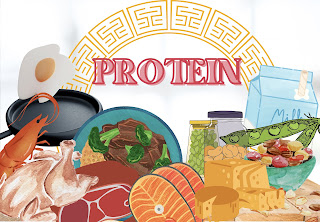Protein is an essential nutrient that plays crucial roles in various bodily functions.
From building and repairing tissues to supporting the immune system, this macronutrient is vital for optimal health.
However, not all protein sources are created equal, and some may come with risks and drawbacks.
In this comprehensive guide, we'll explore everything you need to know about protein, including its definition, animal and plant sources, benefits, and risks.
Definition of Protein
Proteins are complex molecules consisting of amino acids, which are the building blocks of life. There are 20 different amino acids, and our bodies need all of them to form different protein structures.
Proteins are found in every cell, tissue, and fluid of the body and serve many critical functions, including:
• Building and repairing tissues
• Creating enzymes, hormones, and other essential molecules
• Supporting muscle growth and proper function
• Transporting oxygen and nutrients throughout the body
• Regulating the immune system
• Providing energy when carbohydrates and fats are not available
Our bodies naturally produce many amino acids, but others, known as essential amino acids, must come from our diet.
Therefore, protein is an essential nutrient that our bodies cannot function without.
Animal Sources of Protein
Animal sources are considered the most complete sources of protein as they contain all the essential amino acids in the right proportions. These include:
1. Meat
Beef, pork, lamb, and poultry are excellent sources of protein, with beef being the highest. However, red meat is also high in saturated fats and cholesterol, which can increase the risk of heart disease and other health problems.
Therefore, it's best to consume it in moderation.
2. Seafood
Fish and other seafood are also excellent sources of protein, with salmon, tuna, and sardines being among the healthiest.
Fish is rich in omega-3 fatty acids, which have numerous health benefits, such as lowering the risk of heart disease and stroke.
3. Eggs and dairy products
Eggs are one of the most versatile and nutritious foods, containing high-quality protein, healthy fats, and essential vitamins and minerals. Dairy products such as milk, cheese, and yogurt are also rich in protein, calcium, and other nutrients.
However, they can be high in saturated fats and calories, especially if consumed in excess.
Plant Sources of Protein
Plant sources of protein may not contain all the essential amino acids but can still provide adequate amounts of protein when combined with other plant-based foods. These include:
1. Legumes
These include beans, lentils, peas, and chickpeas, which are excellent sources of protein and fiber.
They are also rich in vitamins, minerals, and phytochemicals that have numerous health benefits, such as reducing the risk of heart disease and diabetes.
2. Nuts and seeds
These are good sources of protein, healthy fats, and fiber. Almonds, peanuts, pumpkin seeds, and chia seeds are among the most nutritious and versatile options.
3. Grains and pseudo-grains
Quinoa, buckwheat, and amaranth are examples of pseudo-grains that are higher in protein than traditional grains such as rice and wheat.
Whole grains are also a good source of protein and fiber, such as oats, barley, and whole-wheat bread.
Benefits of Protein
Protein has numerous health benefits, including:
1. Promoting muscle growth and repair
Protein is essential for building and repairing muscle tissues, which can help maintain muscle mass and strength, especially during aging and physical activity.
2. Supporting weight loss
Protein can increase feelings of fullness, reduce appetite and cravings, and boost metabolism, all of which can help with weight loss and weight management.
3. Reducing the risk of chronic diseases
High protein intake has been linked to a lower risk of heart disease, diabetes, and certain cancers.
4. Supporting bone health
Protein is essential for maintaining strong and healthy bones, as it helps the body absorb calcium and other essential minerals.
5. Improving brain function
Protein provides amino acids that are critical for the production of neurotransmitters, which are essential for proper brain function and mood regulation.
Risks of Protein
However, consuming too much protein can also come with risks and drawbacks, such as:
1. Kidney damage
High protein intake can increase the workload on the kidneys and may lead to kidney damage or disease, especially among people with pre-existing kidney problems.
2. Digestive issues
Consuming too much protein can cause constipation, bloating, and indigestion, as well as increase the risk of developing certain digestive disorders.
3. Increased risk of heart disease
High intake of animal protein, especially red and processed meat, has been linked to an increased risk of heart disease and other health problems.
4. Nutrient deficiencies
Focusing too much on protein-rich foods may lead to nutrient deficiencies, especially if you limit your intake of other essential nutrients such as fiber, vitamins, and minerals.
Protein is an essential nutrient that plays many critical roles in the body, from building and repairing tissues to supporting weight loss and reducing the risk of chronic diseases. However, not all protein sources are created equal, and some may come with risks and drawbacks.
Therefore, it's essential to consume adequate but not excessive amounts of protein, and choose a variety of protein sources, both animal and plant-based, to ensure you're meeting your nutritional needs.
As with any dietary changes, it's best to consult with a qualified healthcare provider before making any significant adjustments to your diet.






What a helpful post and something I needed to learn more about!
ReplyDelete